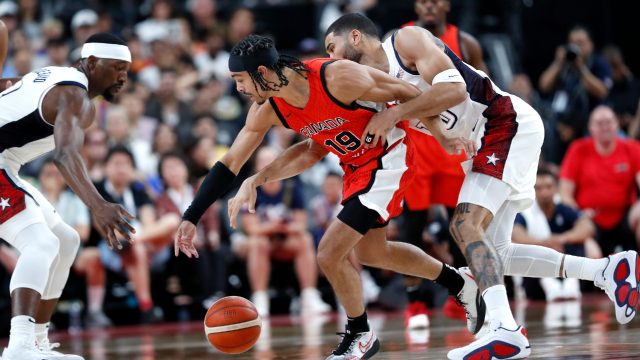
With the opening ceremony just two weeks away, we’re starting to get a much clearer picture of what Russia’s participation will look like at the Paris Olympics.
Reuters reported this week that just 16 Russian athletes currently are scheduled to compete at the Games, all in individual sports. They’ll be listed as ‘individual neutral athletes’, and will not have an anthem played if they do hit the top of the podium.
The International Olympic Committee banned Russia and ally Belarus as competing countries because of the ongoing invasion of Ukraine.
Reuters reports that athletes from the two countries have to undergo a vetting process to make sure they do not support the war or have any connection to the military. Even among those athletes who were approved, several subsequently declined.
On Thursday, the Russian-based RIA State News Agency reported that Russia paid compensation to 245 athletes who did not meet the criteria to compete.
So what does it all mean for the rest of the Olympic competitors?
Well, for starters, it will have a dramatic shakeup on the medal standings. Russia, with 330 athletes, finished third with 71 total medals at the last Summer Games three years ago in Tokyo.
However, the much smaller Russian contingent may not be a huge help for Canada in terms of the medal table. Swimming and track and field, two sports where Canada is expected to take home multiple medals, traditionally are not dominated by Russia.
Tennis star Daniil Medvedev, who has made a deep run at Wimbledon, likely is the highest profile Russian athlete scheduled to compete.
“When I was in Tokyo it was an amazing experience. It was probably one of the biggest memories of my sporting life, which I was surprised (by) because in tennis, we tend to think that the Grand Slams are more important,” he told reporters in March.
“About the neutral flag, I’ll follow the rules. If it’s under a neutral flag I’ll play under a neutral flag and I’m going to try to compete there, show good tennis and try to win, for sure.”
On track
Several key members of the Canadian track and field team will take part in a key Olympic tune-up on Friday at the Diamond League meet in Monaco.
Edmonton’s Marco Arop, projected to win one of Canada’s six gold medals by Nielsen’s Gracenote Sports, lines up in the 800 metres. Arop is the reigning world champ.
Meanwhile, the surging Christopher Morales Williams competes in the 400 metres in his pro debut. The 19-year-old, from Vaughan, Ont., was a virtual unknown before setting an indoor world record and then running the fastest time by anyone at the distance outdoors earlier this year.
Decathlon development
Damian Warner’s quest to win a second straight Olympic gold for Canada in the decathlon may have become a bit easier this week — though, of course, the actual event is the opposite of easy.
World record holder Kevin Mayer of France suffered a hamstring injury last week at his home Diamond League meet in Paris after he crashed in the 110-metre hurdles, AFP reported.
Time will tell what kind of condition Mayer is in when the decathlon starts on Aug. 2.
Soccer test
The reigning Olympic champion Canadian women’s soccer team should get a good idea of where it stands when it faces Australia in a friendly on Saturday in Spain.
Australia finished fourth at last year’s World Cup, which included a 4-0 win over Canada that eliminated the latter side from the competition in the group stage.
Australia also finished fourth at the Tokyo Olympics.
Saturday’s game will have slightly different rules, so will not count in the international rankings, Neil Davidson of The Canadian Press reported.
There will be unlimited substitutions and windows for substitutes.
Canada opens Olympic play on July 25 against New Zealand.
Road warrior
One Canadian Olympian already making headlines in France this summer is cyclist Derek Gee.
The Ottawa native finished third in the ninth stage of the Tour de France on Sunday and sits 11th overall in cycling’s biggest event.
A track cyclist at the Tokyo Olympics, Gee has made an excellent transition to the streets. He’s scheduled to run the road race on Aug. 3 in Paris.
Gee told Velo that weight loss from his track days has made a major difference.
“I was a very different rider, a lot more power-focused and trying to keep on muscle and hitting the gym,” Gee said. “I cut out a lot of that. It’s just been steps in discovering what kind of rider I can be and where I can do well.”